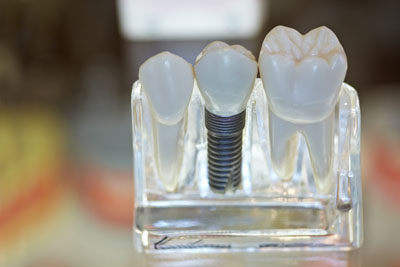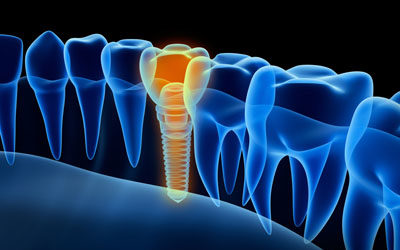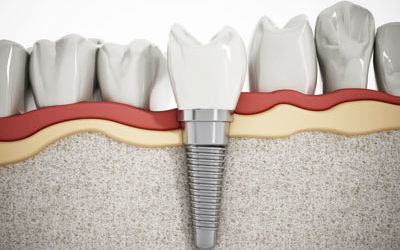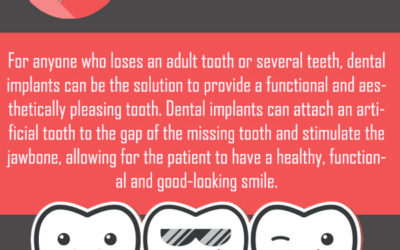Dental implants are artificial tooth roots that support one or more artificial teeth. Dental implants can be used to support fixed (permanent) teeth, or support removable teeth like dentures. This restorative dental option is the closest you can get to healthy, natural teeth.
In addition to replacing missing teeth, dental implants can help the health of your teeth, gums, and jawbone. How?
When a tooth is missing, the surrounding teeth tend to shift out of place, and the bone of the missing tooth begins to deteriorate. Dental implants are the only dental restoration option that preserves natural bone and helps stimulate bone growth.
If you’re already noticing signs of shifting teeth or bone deterioration due to a missing tooth, don’t worry. There are different dental implant options, which you and your dental provider can discuss.
What are the advantages of dental implants?
With advantages like these, it’s no wonder why many people choose dental implants over other dental replacement options:
- Natural smile: Dental implants look and feel just like your natural teeth. You’ll care for them just the same too: brush, floss, and get regular cleanings and checkups. Only you will know you have them.
- Look younger: Dental implants are the only dental restoration option that preserves natural bone, helps stimulate bone growth, and prevent bone loss. Having a jawbone helps retain your natural face shape and smile for years to come.
- Build confidence again: Unlike other replacement options, dental implants won’t slip or click when you talk, eat, laugh, or kiss. You’ll also find your speech is more natural than with dentures.
- Eat whatever: Dentures can slide and cause discomfort when eating. But dental implants function like your natural teeth, allowing you to eat virtually anything you want.
- Proven success: Modern dental implants have been used successfully for over 30 years with a general success rate of 98 percent. When performed by an experienced dental implant doctor, the procedure is one of the safest and most predictable in dentistry.
- Save money: With proper care, dental implants can last a lifetime. Other dental replacement options may appear cheaper upfront, but you will continue to pay that cost over and over, making them expensive in comparison.
Am I a candidate for dental implants?
If you have one or more missing teeth – whether you were born without a tooth or had a tooth removed due to injury, infection, or decay – then the answer is:
Yes, you are likely a candidate for dental implants.
However, many factors that go into how, when, and if you meet the requirements for dental implants, including:
- Age: Children or adolescents may need to wait until their facial growth and development have been completed to ensure long-term success. This stage is typically around age 16 for girls and age 18 for boys.
- Health: If you are a heavy smoker, suffer from uncontrolled chronic disorders like diabetes, or have had radiation therapy to your head or neck area then you will need to be evaluated on an individual basis by your dental provider.
- Enough bone: If you are missing the necessary amount of supportive bone for a dental implant, then you may need a bone augmentation or alternative dental implant.
But for the best answer, based on your situation, you need to consult with your dental provider.
Are there different types of dental implants?
Just like teeth, dental implants come in different heights, sizes, and types. You and your dental provider will create an individualized treatment plan, which may include one of the following types of dental implants:
- Endosteal: These dental implants are placed in the jawbone using a small screw, typically made of titanium. Endosteal is the most common type of dental implant.
- Subperiosteal: These dental implants are placed on or above the jawbone (not in it). This type of implant may be used in patients who don’t have enough supportive bone or are unable to undergo a bone augmentation.
If you don’t have enough jawbone to support a dental implant, there are a few options:
- Bone augmentation: This procedure uses bone additives and growth factors to restore or regenerate bone in your jaw so that it can support an implant.
- Sinus lift: This procedure adds bone below a sinus, where the bone has deteriorated due to missing upper teeth. A sinus lift is also called sinus augmentation or sinus elevation.
- Ridge expansion: If your jaw isn’t wide enough to support dental implants, this procedure adds bone graft material to a small ridge, created along the top of your jaw.
Are dental implants worth it?
Take this quick quiz to find out for yourself:
- Do you want to replace one or more missing teeth?
- Do you want to retain your facial structure?
- Do you want to be able to eat whatever you want?
- Do you want to be confident about your smile and teeth?
- Do you want to save money in the long term?
If you answered yes to any of these questions, then contact your dental provider today to discuss if dental implants are your best option.
- Contact us to schedule your appointment
- Questions? Call us at (818) 405-0717






